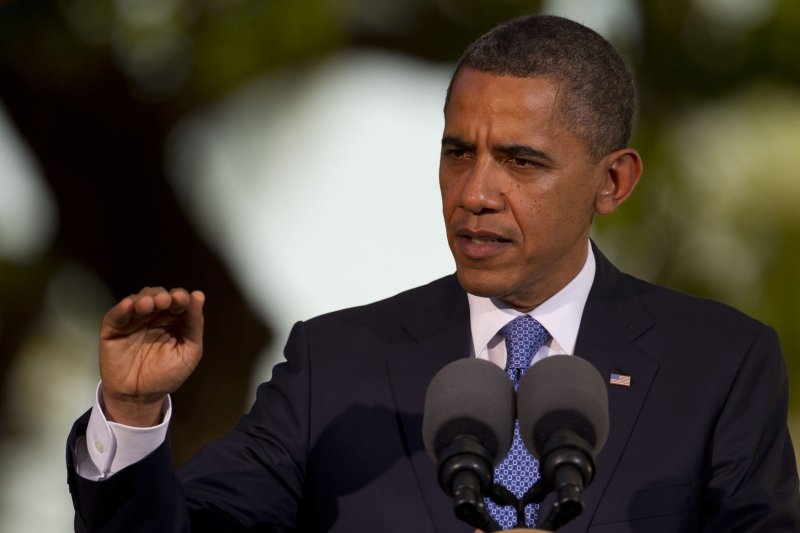1 of 2 | United States President Barack Obama delivers remarks at a press conference after the closing plenary session of the Asia-Pacific Economic Cooperation (APEC) family photo in Honolulu, Hawaii on Sunday, November 13, 2011. UPI/Kent Nishimura/Pool |
License Photo
CANBERRA, Australia, Nov. 16 (UPI) -- President Obama repeated his promise for greater U.S. military involvement in the Pacific in a speech Thursday to the Australian Parliament.
Obama said the move would occur as the United States phases out its presence in Afghanistan and Iraq.
"The United States is a Pacific power, and we are here to stay," Obama said in an address to the Australian Parliament.
The U.S. president said Asia will be "critical" to achieving his "highest priority," creating jobs for Americans.
"With most of the world's nuclear powers and nearly half of humanity, this region will largely define whether the century ahead will be marked by conflict or cooperation, needless suffering or human progress," Obama said.
"As president, I've therefore made a deliberate and strategic decision -- as a Pacific nation, the United States will play a larger and long-term role in shaping this region and its future, by upholding core principles and in close partnership with allies and friends.
"As we consider the future of our armed forces, we have begun a review that will identify our most important strategic interests and guide our defense priorities and spending over the coming decade. And here is what this region must know. As we end today's wars, I have directed my national security team to make our presence and missions in the Asia Pacific a top priority. As a result, reductions in U.S. defense spending will not -- I repeat, will not -- come at the expense of the Asia Pacific."
Before his arrival at Parliament House, the president went to the Hall of Memory where he laid a wreath on the grave of an unknown Australian soldier killed during World War I. After the speech, he met with a group of 18 journalism students at Campbell High School in Canberra.
Obama and Prime Minister Julia Gillard discussed the relationship between their two countries at a news conference Wednesday. Obama said he expects the U.S. military presence in Australia to grow starting in mid-2012.
"What this means in very practical detail is from mid-2012, Australia will welcome deployments of a company-size rotation of 200 to 250 Marines in the Northern Territory for around six months at a time," Gillard said during a joint news conference with Obama in Canberra.
The number of military personnel eventually will expand to 2,500, Gillard said.
Marines will begin rotating through Darwin for joint training and exercises, Obama said, and the Air Force will rotate additional aircraft through more airfields in Northern Australia.
"We'll enhance our ability to train, exercise, and operate with allies and partners across the region, and that, in turn, will allow us to work with these nations to respond even faster to a wide range of challenges, including humanitarian crises and disaster relief, as well as promoting security cooperation across the region," Obama said.
Obama arrived in Australia Wednesday en route to the East Asia summit in Bali, Indonesia. While in Australia, he will address Parliament, visit a school and participate in wreath-laying ceremonies to honor the countries' war dead, among other things.
Obama and Gillard also agreed to several initiatives to expand and deepen cooperation between the two countries in the areas of energy, education, economic development, fighting crime and Afghanistan.
Gillard said the military cooperative initiative was about "stability."
"It will be good for our Australian Defense Force to increase their capabilities by joint training, combined training, with the U.S. Marines and personnel," she said. "It will mean that we are postured to better respond together, along with other partners in the Asia Pacific, to any regional contingency, including the provision of humanitarian assistance and dealing with natural disasters."
Among the issues discussed was Afghanistan, Obama said.
"Obviously, this has not been an easy mission for either of our countries," he said. "But we both understand what happens when al-Qaida has safe havens."
Obama noted that a two-year transition process is under way to help shift security responsibilities to Afghan forces.
"And what I'd say to the Australian people at this point is -- given the enormous investment that's been made and the signs that we can, in fact, leave behind a country that's not perfect, but one that is more stable, more secure, and does not provide safe haven for terrorists -- it's appropriate for us to finish the job and do it right," Obama said
The two leaders also noted that China's rise on the world stage comes with increased responsibilities.
"It's important for them to play by the rules of the road" because it's a win-win situation, Obama said. "There are going to be times where they're not, and we will send a clear message to them that we think that they need to be on track in terms of accepting the rules and responsibilities that come with being a world power."















